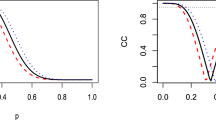Abstract
Conditioning, belief update and revision are important tasks for designing intelligent systems. Possibility theory is among the powerful uncertainty theories particularly suitable for representing and reasoning with uncertain and incomplete information. This paper addresses an important issue related to the possibilistic counterparts of Jeffrey’s rule of conditioning. More precisely, it addresses the existence and uniqueness of the solutions computed using the possibilistic counterparts of the so-called kinematics properties underlying Jeffrey’s rule of conditioning. We first point out that like the probabilistic framework, in the quantitative possibilistic setting, there exists a unique solution for revising a possibility distribution given the uncertainty bearing on a set of exhaustive and mutually exclusive events. However, in the qualitative possibilistic framework, the situation is different. In particular, the application of Jeffrey’s rule of conditioning does not guarantee the existence of a solution. We provide precise conditions where the uniqueness of the revised possibility distribution exists.
Similar content being viewed by others
References
Benferhat, S., Dubois, D., Prade, H., Williams, M.A.: A framework for iterated belief revision using possibilistic counterparts to Jeffrey’s rule. Fundam. Inform. 99(2), 147–168 (2010)
Benferhat, S., Smaoui, S.: Possibilistic causal networks for handling interventions: a new propagation algorithm. In: Proceedings, 22nd AAAI Conference on Artificial Intelligence (AAAI’07), pp. 373–378. AAAI Press, Menlo Park (2007)
Benferhat, S., Tabia, K., Sedki, K.: On analysis of unicity of Jeffrey’s rule of conditioning in a possibilistic framework. In: Proceedings, 11th International Symposium on Artificial Intelligence and Mathematics (ISAIM’10). Florida, USA (2010)
Borgelt, C., Kruse, R.: Learning from imprecise data: possibilistic graphical models. Comput. Stat. Data Anal. 38(4), 449–463 (2002)
Borgelt, C., Gebhardt, J., Kruse, R.: Possibilistic graphical models. In: Proceedings, International School for the Synthesis of Expert Knowledge (ISSEK’98), pp. 51–68. Udine, Italy (1998)
Boutilier, C.: Revision sequences and nested conditionals. In: Proceedings, 13th International Joint Conference on Artificial Intelligence (IJCAI’93), pp. 519–531 (1993)
Chan, H., Darwiche, A.: On the revision of probabilistic beliefs using uncertain evidence. Artif. Intell. 163(1), 67–90 (2005). doi:10.1016/j.artint.2004.09.005
Darwiche, A.: Modeling and Reasoning with Bayesian Networks. Cambridge University Press, Cambridge (2009)
Domotor, Z.: Probability kinematics and representation of belief change. Philos. Sci. 47, 384–403 (1980)
Dubois, D.: Three scenarios for the revision of epistemic states. J. Log. Comput. 18(5), 721–738 (2008)
Dubois, D., Prade, H.: Possibility Theory. Plenum Press, New York (1988)
Dubois, D., Prade, H.: Belief revision and updates in numerical formalisms: an overview, with new results for the possibilistic framework. In: Proceedings, International Joint Conference on Artificial Intelligence (IJCAI’93), pp. 620–625 (1993)
Dubois, D., Prade, H.: A synthetic view of belief revision with uncertain inputs in the framework of possibility theory. Int. J. Approx. Reason. 17(2–3), 295–324 (1997). ftp://ftp.irit.fr/pub/IRIT/RPDMP/SVBRUI.ps.gz
Grünwald, P.D., Halpern, J.Y.: Updating probabilities. J. Artif. Intell. Res. 19(1), 243–278 (2003)
Hisdal, E.: Conditional possibilities independence and non interaction. Fuzzy Sets Syst. 3(4), 283–297 (1978)
Jeffrey, R.: The Logic of Decision. McGraw Hill, New York (1965)
Konieczny, S., Perez, R.P.: Improvement operators. In: Proceedings, 11th International Conference on Principles of Knowledge Representation and Reasoning (KR’08), pp. 177–186 (2008)
Papini, O.: Iterated revision operations stemming from the history of an agent’s observations. In: Williams, M.A., Rott, H. (eds.) Frontiers of Belief Revision, pp. 279–301. Kluwer Academic, Norwell (2001)
Pearl, J.: Probabilistic Reasoning in Intelligent Systems: Networks of Plausible Inference. Morgan Kaufmann, San Francisco (1988)
Pearl, J.: Causality: Models, Reasoning, and Inference. Cambridge University Press, Cambridge (2000)
Skyrms, B.: Maximum entropy inference as a special case of conditionalization. Synthese 63(1), 55–74 (1985)
Spohn, W.: Ordinal conditional functions: a dynamic theory of epistemic states. In: Causation in Decision, Belief Change, and Statistics, vol. II, pp. 105–134. Kluwer Academic, Norwell (1988)
Vomlel, J.: Probabilistic reasoning with uncertain evidence. Neural Netw. World (International Journal on Neural and Mass-Parallel Computing and Information Systems) 14(5), 453–456 (2004)
Yager, R.: Fuzzy Set and Possibility Theory: Recent Developments. Pergamon, New York (1982)
Yager, R.: An introduction to applications of possibility theory. Hum. Syst. Manag. 3, 246–269 (1983)
Zadeh, L.: Fuzzy sets as a basis for a theory of possibility. Fuzzy Sets Syst. 1(1), 3–28 (1978)
Author information
Authors and Affiliations
Corresponding author
Rights and permissions
About this article
Cite this article
Benferhat, S., Tabia, K. & Sedki, K. Jeffrey’s rule of conditioning in a possibilistic framework. Ann Math Artif Intell 61, 185–202 (2011). https://doi.org/10.1007/s10472-011-9262-x
Published:
Issue Date:
DOI: https://doi.org/10.1007/s10472-011-9262-x




